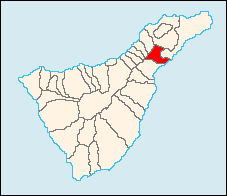
El Rosario, Santa Cruz de Tenerife
Encyclopedia
| El Rosario | |
| Map | |
|---|---|
 |
|
| Statistics | |
| Autonomous region: | Canary Islands Canary Islands The Canary Islands , also known as the Canaries , is a Spanish archipelago located just off the northwest coast of mainland Africa, 100 km west of the border between Morocco and the Western Sahara. The Canaries are a Spanish autonomous community and an outermost region of the European Union... |
| Province: | Santa Cruz de Tenerife Santa Cruz de Tenerife (province) Province of Santa Cruz de Tenerife also Province of Santa Cruz is a province of Spain, consisting of the western part of the autonomous community of the Canary Islands. It consists of about half of the Atlantic archipelago, including the islands of Tenerife, La Gomera, El Hierro, and La Palma, and... |
| Island: | Tenerife Tenerife Tenerife is the largest and most populous island of the seven Canary Islands, it is also the most populated island of Spain, with a land area of 2,034.38 km² and 906,854 inhabitants, 43% of the total population of the Canary Islands. About five million tourists visit Tenerife each year, the... |
| Area Area Area is a quantity that expresses the extent of a two-dimensional surface or shape in the plane. Area can be understood as the amount of material with a given thickness that would be necessary to fashion a model of the shape, or the amount of paint necessary to cover the surface with a single coat... : |
39.42 km² some reads 39.75 km² |
| Population Population A population is all the organisms that both belong to the same group or species and live in the same geographical area. The area that is used to define a sexual population is such that inter-breeding is possible between any pair within the area and more probable than cross-breeding with individuals... : |
16,024 (January 1, 2005 January 2005 January 2005: ← – January – February – March – April – May – June – July – August – September – October – November – December – →... ) |
| Population density Population density Population density is a measurement of population per unit area or unit volume. It is frequently applied to living organisms, and particularly to humans... : |
406.44/km² |
| Elevation Elevation The elevation of a geographic location is its height above a fixed reference point, most commonly a reference geoid, a mathematical model of the Earth's sea level as an equipotential gravitational surface .... : Lowest: Centre: Highest: |
Atlantic Ocean 905 m - |
| Website: | www.ayuntamientoelrosario.org |
El Rosario (meaning "The Rosary
Rosary
The rosary or "garland of roses" is a traditional Catholic devotion. The term denotes the prayer beads used to count the series of prayers that make up the rosary...
") is a municipality of the northeastern part of the island of Tenerife in the Santa Cruz de Tenerife
Santa Cruz de Tenerife (province)
Province of Santa Cruz de Tenerife also Province of Santa Cruz is a province of Spain, consisting of the western part of the autonomous community of the Canary Islands. It consists of about half of the Atlantic archipelago, including the islands of Tenerife, La Gomera, El Hierro, and La Palma, and...
province, on the Canary Islands
Canary Islands
The Canary Islands , also known as the Canaries , is a Spanish archipelago located just off the northwest coast of mainland Africa, 100 km west of the border between Morocco and the Western Sahara. The Canaries are a Spanish autonomous community and an outermost region of the European Union...
. The city is also a suburban area of the Santa Cruz de Tenerife area. The seat of the municipality is La Esperanza, located in the mountains to the west.
The population is 15,542 (ISTAC, 2003), its density is 390.99/km² and the area is 39.42 km². El Rosario is linked with the old highway linking Abona and Santa Cruz de Tenerife and the TF1 superhighway and is linked with the TF2 to the north.
Its economy consists of business, tourism, and some agriculture
Agriculture
Agriculture is the cultivation of animals, plants, fungi and other life forms for food, fiber, and other products used to sustain life. Agriculture was the key implement in the rise of sedentary human civilization, whereby farming of domesticated species created food surpluses that nurtured the...
. Tourism is less common than on its coastline and in the two large cities on Tenerife. The urban area dominates the coastline. There are farmlands in valley areas and the mountains with grasslands and some forests to the west.
History
| Year | Population | Density |
|---|---|---|
| 1991 | 8,103 | - |
| 1996 | 10,880 | - |
| 2001 | 13,462 | 345.17/km² |
| 2002 | 13,718 | - |
| 2003 | 14,862 | 377.03/km² |
| 2004 | 15,542 | 390.99/km² |
| 2005 | 16,024 | 406.49/km² |
Other
El Rosario has schools, lyceums, a few gymnasia, banks, churches, beaches and squares (plazaPlaza
Plaza is a Spanish word related to "field" which describes an open urban public space, such as a city square. All through Spanish America, the plaza mayor of each center of administration held three closely related institutions: the cathedral, the cabildo or administrative center, which might be...
s).

